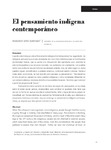| dc.contributor.author | López Bárcenas, Francisco |
| dc.date.issued | 2016-12 |
| dc.identifier.citation | López Bárcenas, Francisco, “El pensamiento indígena contemporáneo”, en Tema y Variaciones de Literatura, núm. 47, semestre II de 2016, UAM-A, pp. 13-19. |
| dc.identifier.issn | 1405-9959 |
| dc.identifier.uri | http://hdl.handle.net/11191/5852 |
| dc.description | 7 páginas. tyvlxlvii |
| dc.description.abstract | Cuando este Coloquio sobre Pensamiento Indígena Contemporáneo fue organizado, los indígenas pensaron que el país atravesaba por una crisis civilizatoria que se manifestaba de múltiples formas, que se asistía a la intervención del capitalismo para controlar la vida de los pueblos y sus recursos naturales. Las evidencias son alarmantes. Los pueblos indios son producto de una historia casi siempre violenta. Hoy, en pleno siglo xxi, estos pueblos siguen subordinados a poderes externos, continúan siendo colonias. Frente a todas estas condiciones, se han reunido para expresar su pensamiento: “Hoy tenemos el reto de pensar, pensarnos como pueblos indígenas y como sociedades diferentes en un contexto adverso, tenemos derecho a la autodeterminación. Tenemos que construir a partir de proyectos de futuro.” Toda práctica tiene sustento en los mitos de origen de cada pueblo, en sus ideas sobre el orden social, justicia, reciprocidad, para construir la igualdad. Esto tiene que ver con la forma en que se concibe el conocimiento. Mito y logos tienen su propia racionalidad, son formas distintas de explicar los fenómenos de la vida, que obedecen a situaciones históricas concretas. Hoy se construye un pensamiento indígena contemporáneo, se requiere que éste genere conciencia social. |
| dc.description.abstract | When this colloquium was organized, some indigenous people thought that the country is going through a civilizing crisis manifested in many ways. The evidence is shocking. The ingenous people are the product of history, which is most of the time violent. Now days in the 21st century the indigenous people are still attached to external powers, which keep them being part of the colony. From this considerations this people have gathered to express their own thought: “Today we have the challenge of think, to think ourselves as indigenous people and as different society in an unfavorable context, we have the right to determine our selves. We have to build on future projects” Every practice has its basis in the myths of origin of each people, in their own ideas about social order, justice and reciprocity to build equality. This is related to the way of how knowledge is conceived. Myth and logos have their own rationality, they are different ways of explaining the phenomena of life, which are related to concrete historical situations. Today the indigenous thought is being conceived, but it requires a social awareness. |
| dc.format | pdf |
| dc.language.iso | spa |
| dc.publisher | Universidad Autónoma Metropolitana, Unidad Azcapotzalco, División de Ciencias Sociales y Humanidades, Departamento de Humanidades |
| dc.subject | Crisis civilizatoria; Colonialismo interno; Subordinación; Conciencia social; Autodeterminación; Etnia. Civilized crisis; Internal colonialism; Subordination; Contemporary indigenous thought; Social awareness; Self-determination; Ethnic group. |
| dc.subject | Civilized crisis; Internal colonialism; Subordination; Contemporary indigenous thought; Social awareness; Self-determination; Ethnic group. |
| dc.subject.classification | HUMANIDADES Y CIENCIAS DE LA CONDUCTA::CIENCIAS DE LAS ARTES Y LAS LETRAS::TEORÍA, ANÁLISIS Y CRÍTICA LITERARIAS |
| dc.title | El pensamiento indígena contemporáneo |
| dc.type | Article |
| dc.audience | generalPublic |
| dc.format.digitalOrigin | Born digital |



